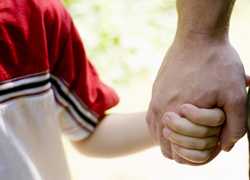TB Personal Stories
Rick and Francene’s Story

Rick and Francene’s Story
In 2003, Rick and Francene adopted a 13-month-old boy from Russia. Shortly after returning to the United States, they learned he had tuberculosis (TB). A second son adopted from Russia 2 years later was found to have latent TB infection.
It was at their son’s first doctor’s appointment in the United States that a TB skin test was ordered. The test results came back as borderline. But their son had moved around during the test and had been stuck twice, so they thought that was the cause of the reaction. “Little did we know what we were in for,” says Francene. A follow-up chest x-ray did not reveal TB, so they were told to bring their son in for an x-ray again in 6 months.
Six months later the follow-up x-ray was done, but showed very different results. “This time we were not even home from the appointment before the doctor’s office called to tell us our son had TB,” says Francene. That same evening, Tammy, the TB Control Division’s Nurse Consultant at the South Carolina Department of Health and Environmental Control, contacted the family. “I remember it was around 6:30 in the evening. She really helped me feel better. My husband and I were terrified, since we didn’t have any idea what TB treatment involved. All we had heard of were stories of sanatoriums and isolation.”
Tammy talked with the parents and provided additional information to read. “She made sure all of our questions were answered. She would consult with the doctors, if needed, to get us answers. Tammy educated me in such a way that I was able to reach out to the other parents on our adoption agency’s online post board,” recalls Francene. “I urged other parents to have their kids retested for TB a second time, 6 months after the first test.”
"For others who may receive a TB diagnosis and must undergo treatment, I would say, if a 13-month-old child can do it, anyone can. Treatment is nothing like it used to be, and you can still live your life. Always feel comfortable to ask questions. It can be scary, but the health department is a wealth of knowledge."
Treatment for Francene and Rick’s son was difficult. “For the first 3 or 4 months, our son was given a combination of five drugs, one of which had to be given by injection. His treatment schedule was 5 days a week, with weekends off. Then he was given 3 drugs per day, 5 days a week for the remaining 3 months,” Francene recalls.
During the course of their son’s treatment, two TB nurses, Tammy and Kimberly, worked with the family. “Both Tammy and Kimberly were so caring and understanding. I wouldn’t have traded them for the world.”
Two years after adopting their first child, Rick and Francene adopted another child from Russia. “When he tested positive for latent TB infection, we were the ones calling the local health department and asking if we could work with the same TB nurses again for his treatment.”
“Through this process we realized that what you don’t know can be terrifying, but knowledge is power. It is power to calm and comfort, power to understand the end result is worth the effort, power to heal and ensure that our new family would truly be our forever family,” says Francene.
It’s been over 9 years since Rick and Francene’s oldest boy was diagnosed with TB, and 7 years since their second son was diagnosed with latent TB infection. “The boys are now 10 and 9, strong as can be, full of energy, and rarely sick,” says Francene. “Their TB is just a distant memory now, a time that neither child even remembers. But I will never forget the nurses and staff from the health department.”
“We chose to share our story because when our son was diagnosed with TB, we didn’t know anyone else who had TB, or where to turn for an encouraging word from someone who had experienced the TB treatment themselves,” explains Francene. “If by sharing our story it gives some support to others or convinces one family to get their foreign-born child tested, and treated if necessary, it means that our sons maybe went through this for a reason.”
“For others who may receive a TB diagnosis and must undergo treatment, I would say, if a 13-month-old child can do it, anyone can,” advises Francene. “Treatment is nothing like it used to be, and you can still live your life. Always feel comfortable to ask questions. It can be scary, but the health department is a wealth of knowledge.”
More TB Personal Stories
- Page last reviewed: March 15, 2013
- Page last updated: March 15, 2013
- Content source:


 ShareCompartir
ShareCompartir